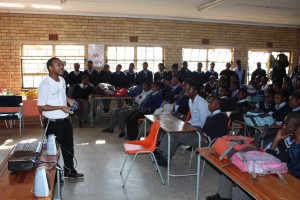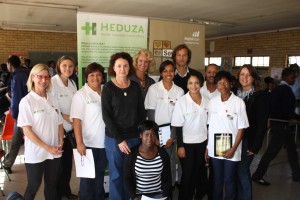A large team consisting of several professors, physicians, dieticians, nurses and basic science students from the Hatter Institute for Cardiovascular Research in Africa, University of Cape Town (www.hatter.uct.ac.za), Soweto Cardiovascular Research Unit (Socru – www.socru.org), University of the Witwatersrand and Health Education South Africa (HEDUZA) recently visited Ibhongo Secondary School in Soweto, as part of the campaign to increase awareness among African teenagers about the numerous issues concerning healthy lifestyles.

 On a morning filled with information, multimedia presentations and on‐site medical testing, it was clear that much was learnt, and the messages presented had an impact on the students. “We want to create awareness of the chronic diseases of lifestyle,” said Professor Karen Sliwa, director of the Hatter Institute for Cardiovascular Research in Africa and Socru (www.socru.org) University of Cape Town (www.hatter.uct.ac.za). “We want teenagers to understand the importance of taking responsibility for their way of living and following basic principles of a healthy lifestyle.” She stressed the importance of talking to teenagers in this regard. “It makes sense to start early. Prevention is always cheaper and more effective than cure.”
On a morning filled with information, multimedia presentations and on‐site medical testing, it was clear that much was learnt, and the messages presented had an impact on the students. “We want to create awareness of the chronic diseases of lifestyle,” said Professor Karen Sliwa, director of the Hatter Institute for Cardiovascular Research in Africa and Socru (www.socru.org) University of Cape Town (www.hatter.uct.ac.za). “We want teenagers to understand the importance of taking responsibility for their way of living and following basic principles of a healthy lifestyle.” She stressed the importance of talking to teenagers in this regard. “It makes sense to start early. Prevention is always cheaper and more effective than cure.”
After being officially welcomed by the principal and the class teachers, which included a song from the students, Professor Sliwa introduced the teams from the Hatter Institute, Socru and HEDUZA (www.heduza.org), and thanked those who made the programme possible, including BHP Billiton and the Medtronic Foundation.
The students were then taken through various aspects of healthy living. Dietician Sandra Pretorius introduced the idea of a maximal intake of fruit, vegetables and fibre, and avoiding fatty foods, salt and processed food.
The learners also listened to a talk by basic science PhD student Gerald Maarmann, who spoke about the myth of healthy food being more expensive, the value of exercise and the importance of understanding and monitoring your health; and Professor Sandrine Lecour of the Hatter Institute, who gave a presentation on basic science, which provided learners with more insight around cellular mechanisms leading to, for example, hypertension or diabetes, and possibly chronic diseases such as heart failure or strokes.
Three short clips were played, each giving a voice to a student who has come to realise the importance of choosing a healthy lifestyle. This was significant as it forms part of the organisers’ willingness to use a variety of media to deliver health messages.
Dr Friedrich Thienemann of the University of Cape Town and HEDUZA discussed using different media to deliver health messages, and gauged the students’ response to the presentation of health information in different formats, such as on iPads or through various internet browsers.
The learners were then invited to work with internet‐based health information made available to them by Professor Lori Blauwet and several students and nurses. The classroom was a hive of activity as the teenagers discovered various aspects of their health, such as blood pressure and body‐mass index.
They were also encouraged to answer questionnaires about their eating habits and preferences. “We keep all data we collect,” said Pretorius. “We use it to structure our programmes and to identify where the issues are.”
Ibhongo is the second school to host the awareness programme for African teenagers. Two more awareness days to be hosted at secondary school level are scheduled to follow this year.
Comments are closed.